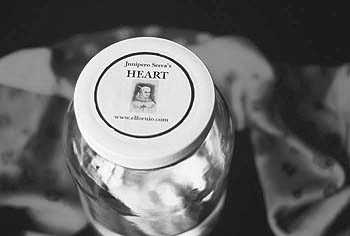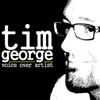iv.
OUR DRINKS ARRIVED at the bar of the Rusty Pelican. One of
the perks of being with Janet was that bar seats and restaurant
tables suddenly became available whenever she showed up.
I had my usual cold, Negro Modelo, in
a glass, and a snifter of Cazadores. Janet had her demented
White Zin, sparkling like pink punch in a heavy stemmed glass.
A warm wind of roasted tri-tip feathered in the door. I could
see Heaney and his pelican costume entertaining a group of Germans
on the far side of the big room, having no idea how much Sean
was making fun of them—complete revenge for the Ardennes
Forest. Some Fornay were watching him as well, red faced and
drinking, laughing along with the Pelican. The Fornay bowed
their heads to Janet and greeted her, slightly embarrassed that
they had been found out. Janet returned their greetings and
chatted with them. When she turned to come back to the bar,
they shuffled quickly out of sight with their beers and tequilas
in hand.
“I know two of those guys aren’t supposed
to be here,” Janet, sitting up on the bar stool in her
gray slacks, matching blazer and white shirt. “Their wives
are going to be pissed.”
“I recognize the one guy,” I said. “I’ve
seen him face down around town.”
“I made his buddies promise to get him home.”
“Drunken Indians.”
Janet took a look around the place, adjusted her
shirt, smiled,and lifted her glass to toast. “To Old Spanish
Days.”
“To measles, fire water and glass beads.”
She toasted and I put my glass on the bar.
“Drink!” she chided me. “You always
do that”
And I did. I had a strange habit of toasting and
not drinking, like I really didn’t believe in what I was
doing. I toasted back.“To the rest of our lives, sis,”
We both drank. The tequila was like firey sunshine.
I became warm. Firecrackers and Germans punctuated the sounds
of hilarity and libational positivism at the Rusty Pelican.
Heaney and his pelican act were on in a way I hadn’t seen
in a while. Since the Fornay had a Pelican cult tradition within
their own culture, the three Indians enjoyed seeing Sean mess
with the Germans. But the Germans—after eight or nine beers
each—seemed happy to be messed with.
Janet filled me in on her lawsuit against the Fornay,
where she essentially was suing the tribe, her own people, to
comply with the Clean Water Act.
The town of El Fornio, California versus the Fornay
Indian Tribe was all about two or so thousand years of shits
being taken up in the Pass and now the effluent was making its
way through three thousand feet of sandstone into the wells
and cisterns of city and local wells.
“Human shit, and I don’t care if it is
Native American shit,” said local tomatillo farmer, Ned
Mason. “Ain’t fertilizer. It’s shit.”
And I knew a lot about that shit—as did anyone
who kept up their reading in the local paper.
I had been on retainer the last four years to identify
and DNA a well defined stash of Fornay turds and compare them
with the colo-fecal DNA found in the water coming off of the
mountain. You can imagine how fun that was. As for Janet, not
only was she in a quandary having to sue the tribe, the Fornay
themselves were up against their own kind of legal and cultural
irony: Being a water cult, they believed that water was the
presence of real magic and religion in the world, an ever-present
transcendence, both practical and unique, that didn’t depend
on faith and waiting around for a savior. It was already here.
You had to thank every asteroid that ever smashed into the planet
for bringing lush water to the world. Unfortunately, it wasn’t
until about 1980 that the Fornay realized they had been shitting
on it for two thousand-odd years.
I looked out one of the big bay windows of the resaturant,
hand- and fingerprint-smudged as it was, and saw the sun falling,
the shadows beginning to move amongst candlepower and lanterns.
Depending upon age and ethnicity, everyone downtown was high
on some kind of sugar, protein, alcohol, or datura. The sound
of Fornay elders, other run-of the-mill Indians, Mariachis,
tourists, and the El Fornio High School Moor marching band and
their costumed horses, rose into a dusty midden above the city.
Our little crazed town at that instant was a clinkety-clack
of party favors, both ancient and new. Just to the south, the
contrail crystals of a Minuteman rocket launch out of Vandenberg
Air Force base began to show themselves through the sunlight
with the pastel colors of Lucky Charms marshmallows. Festival
goers in the street turned to look up at the hot flare of the
rocket and its trail before it disappeared into the upper atmosphere,
heading for the South Pacific.
I turned to Janet, whose face was going pink. “Let’s
head back to my place.”
She looked me over.
“I mean the historical society when I say my
place,” I said. “I’ve got something to show you.”
“Alright,” she nodded. “It is Friday.”
“Yeah," I assured her. "You're going
to win, Janet. Just not in the next three hours. So relax.”
We split the tab, waved to Sean and his pelican
act, and headed out of the Rusty and back into the crowd.
As we hit the din, there was the jing-jing-jing
of an ice cream peddler hitting his bell. Heads in the crowd
cocked and gleaned towards the colors of the Minuteman launch.
Janet and I took a side street. At times like this,
we did end up like brother and sister. I would never try to
hold her hand and she would just keep up with me, like a buddy
on a hike. Sometimes she would get ahead and I would have to
keep up with her.
As we passed the front of the historical society,
I was still trying to figure out what it was that I had to show
her. While I really hadn’t lied, I just hadn’t figured
out what it was.
“Here, let’s go around back. When was
the last time you were here?” I wondered.
“A couple of months of ago. Remember? I brought
some Fornay kids down to look at the padre’s heart.”
“Oh, yeah. One of your tribal history lessons.”
“As I remember,” Janet became factual.
“They spent more time looking at your mahogoney cases of
dried turds than paying attention to the heart.”
“Oohing and awing, I would call it,” I
smiled. “The kids knew that they could be related to the
carpolites. But the heart? How are you going to get that across
to them.”
As we approached the backside of the building, I
saw the rear entrance was open, the breeze floating the pine
door back and forth on its hinges. I paused for a moment and
reflected—did I leave that open?
We wandered into the building. Up to the point of
finding the door open, I was still wondering what I was going
to show Janet. We looked around, gauging the room and hallways.
“Hello?” I hollered. Only the sound of
the festival outside.
The cash register seemed fine. The books were all
in place. The mahagony cases shining to the side casting sharp
yellow light. But something was different. It was Janet who
noticed first.
“It’s gone,” she let.
“What’s gone?” I looked, following
her eyes.
“The heart. The heart is gone,” she said
calmly.
And sure enough it was. A round area of clear table
top sat in the middle of the dust where the heart had been.
Whomever had grabbed it was sure to lift the jar straight up
and not leave a mark.
“Who would steal Junipero Serra’s heart?”
I asked, perplexed, holding back a laugh.
Janet looked at me. “You never really paid
much attention to this part, Hank.”
“What part?”
“The heart part,” she said.
“I guess not,” I nodded, starting another
laugh. “But I don’t get it. Who would take the heart?
Janet looked me over, not as a sister or even a
friend. Her eyes narrowed and she turned slightly askance. I
saw that she was completely separate from me as her thoughts
focused on a blank part of the room, on an empty spot on the
wall.
“Only about a two or three dozen people,”
she replied. “Most of whom we know.”
"Sheesh," I thought, and laughed one more
time.
|




